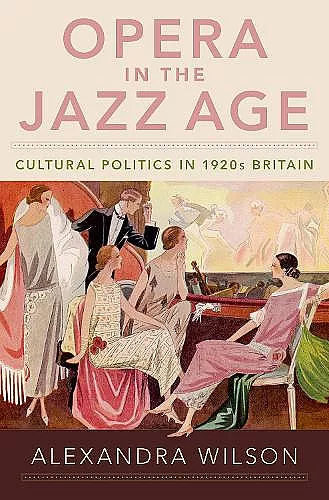Opera in the Jazz Age
Cultural Politics in 1920s Britain
Format:Hardback
Publisher:Oxford University Press Inc
Published:21st Feb '19
Currently unavailable, and unfortunately no date known when it will be back

Jazz, the Charleston, nightclubs, cocktails, cinema, and musical theatre: 1920s British nightlife was vibrant and exhilarating. But where did opera fit into this fashionable new entertainment world? Opera in the Jazz Age: Cultural Politics in 1920s Britain explores the interaction between opera and popular culture at a key historical moment when there was a growing imperative to categorize art forms as "highbrow," "middlebrow," or "lowbrow." Literary studies of the so-called "battle of the brows" have been numerous, but this is the first book to consider the place of opera in interwar debates about high and low culture. This study by Alexandra Wilson argues that opera was extremely difficult to pigeonhole: although some contemporary commentators believed it to be too highbrow, others thought it not highbrow enough. Opera in the Jazz Age paints a lively and engaging picture of 1920s operatic culture, and introduces a charismatic cast of early twentieth-century critics, conductors, and celebrity singers. Opera was performed during this period to socially mixed audiences in a variety of spaces beyond the conventional opera house: music halls, cinemas, cafés and schools. Performance and production standards were not always high - often quite the reverse - but opera-going was evidently great fun. Office boys whistled operatic tunes they had heard on the gramophone and there was a genuine sense that opera was for everyone. In this provocative and timely study, Wilson considers how the opera debate of the 1920s continues to shape the ways in which we discuss the art form, and draws connections between the battle of the brows and present-day discussions about elitism. The book makes a major contribution to our understanding of the cultural politics of twentieth-century Britain and is essential reading for anybody interested in the history of opera, the battle of the brows, or simply the perennially fascinating decade that was the 1920s.
This is an interesting book on a topic that has received little scholarly attention. * W.E. Grim, CHOICE *
Scrupulously researched and forcefully argued. * BBC Music Magazine *
Through extensive primary-source analysis, Wilson captures an historical moment in which opera maintained social mobility and mass-culture appeal. [...] Not only does [the book] call into question longstanding presumptions about the intersections of opera, class, and politics, but it also points to methods for defining a heretofore littlestudied middlebrow culture. Thus, by demonstrating opera's pervious "resistance to reductive labeling", Wilson begins to reveal the cracks in social hierarchies long papered over by faulty cultural assumptions. * Journal of Musicological Research *
A richly textured account * Cambridge Opera Journal *
What a book. This is a glorious work of scholarship that's one of the most readable and intelligent scholarly monographs I've encountered. Seriously impressive. * Nathan Waddell, Senior Lecturer, University of Birmingham *
Wilson is one of those rare musicologists capable of seeing opera in its widest historical context... Impressively researched and highly entertaining. * Opera *
Wilson is interested in how opera, seen as a "foreign" art form, fit into the British cultural scene in the 1920s. She is particularly interested in where opera fit into the ongoing discussions of "highbrow," "middlebrow," and "lowbrow" art and efforts to combat charges of elitism... For Wilson, opera in the decade was interesting precisely because it could not be pinned down in this system of cultural categorization. * John M. Clum, New York Journal of Books *
Alexandra Wilson's interest in the British operatic scene during the jazz age is longstanding, and, in this book, she imparts her wealth of knowledge in a lively and readable manner. She reveals that opera in the 1920s was the subject of fierce controversy-too highbrow for some, and not highbrow enough for others. Diving into impassioned, often rancorous, debates about opera, Wilson argues that much of the vexation was generation by peculiarly British notions of nationality and social class. It is essential reading for anyone who remains under the impression that this decade was an operatic wilderness in the UK. * Derek B. Scott, Professor of Critical Musicology, University of Leeds *
ISBN: 9780190912666
Dimensions: 163mm x 236mm x 28mm
Weight: 431g
256 pages